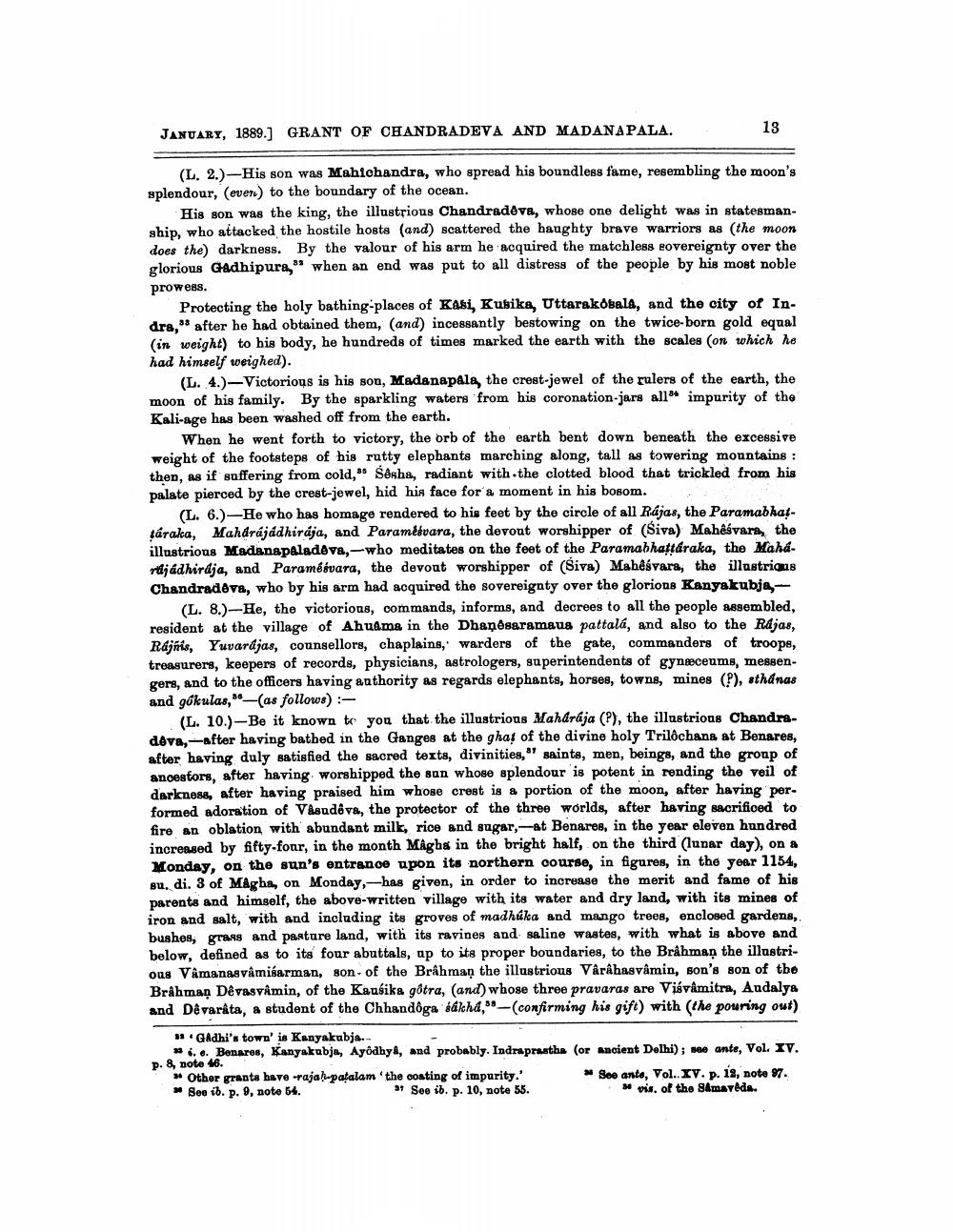________________
JANUARY, 1889.) GRANT OF CHANDRADEVA AND MADANAPALA.
13
-
(L. 2.)-His son was Mahichandra, who spread his boundless fame, resembling the moon's splendour, (even) to the boundary of the ocean.
His son was the king, the illustrious Chandradėve, whose one delight was in statesman. ship, who attacked the hostile hosts (and) scattered the haughty brave warriors as the moon does the) darkness. By the valour of his arm he acquired the matchless sovereignty over the glorious Gadhipura," when an end was put to all distress of the people by his most noble prowess.
Protecting the holy bathing-places of Kasi, Kusike, Uttarakóbala, and the city of Indra," after he had obtained them, (and) incessantly bestowing on the twice-born gold equal (in weight) to his body, he hundreds of times marked the earth with the scales (on which he had himself weighed).
(L. 4.)- Victorious is his son, Madanapala, the crest-jewel of the rulers of the earth, the moon of his family. By the sparkling waters from his coronation-jars all® impurity of the Kali-age has been washed off from the earth.
When he went forth to victory, the brb of the earth bent down beneath the excessive weight of the footsteps of his ratty elephants marching along, tall as towering mountains : then, as if suffering from cold," Sasha, radiant with the clotted blood that trickled from his palate pierced by the crest-jewel, hid his face for a moment in his bosom.
(L. 6.)He who has homage rendered to his feet by the circle of all Rajas, the Paramabhatļáraka, Mahdrájddhirája, and Paramétvara, the devout worshipper of (Siva) Mahāśvara, the illustrious Madanapaladeva, -who meditates on the feet of the Paramabhattáraka, the Mahárdjádhirdja, and Paramétvara, the devout worshipper of (Siva) Mahêśvara, the illustrious Chandraddva, who by his arm had acquired the sovereignty over the glorious Kanyakubja,
(L. 8.)-He, the victorious, commands, informs, and decrees to all the people assembled, resident at the village of Ahudma in the Dhanogaramaus pattala, and also to the Rajas, Rájnis, Yuvardjas, counsellors, chaplains, warders of the gate, commanders of troops, treasurers, keepers of records, physicians, astrologers, superintendents of gynæceums, messengers, and to the officers having authority as regards elephants, horses, towns, mines (?), sthanas and gókulas,*-(as follows) :
(L. 10.)-Be it known to you that the illustrious Mahdrája (P), the illustrious Chandradeva,-after having bathed in the Ganges at the ghat of the divine holy Trilochana at Benares, after having duly satisfied the sacred texts, divinities," saints, men, beings, and the group of ancestors, after having worshipped the sun whose splendour is potent in rending the veil of darkness, after having praised him whose crest is a portion of the moon, after having per. formed adoration of Vasudeva, the protector of the three worlds, after having sacrificed to fire an oblation with abundant milk, rice and sugar,--at Benares, in the year eleven hundred increased by fifty-four, in the month Magha in the bright half, on the third (lunar day), on a Monday, on the sun's entrance upon its northern course, in figures, in the year 1154, 81. di. 3 of Mågha, on Monday,-has given, in order to increase the merit and fame of his parents and himself, the above-written village with its water and dry land, with its mines of iron and salt, with and including its groves of madhúka and mango trees, enclosed gardens, bushes, grams and pasture land, with its ravines and saline wastes, with what is above and below, defined as to its four abuttals, ap to its proper boundaries, to the Brahman the illustrious Vâmanasvamisarman, son of the Brahmaņ the illustrious Vårahasvamin, son's son of the Brahman Dêvasvamin, of the Kausika gôtra, (and) whose three pravaras are Visvâmitra, Audalya and Devarata, a student of the Chhandoga šákhá,*-(confirming his gift) with the pouring out)
. GAdhi's town' is Kanyakubja. * 1... Benares, Kanyakubja, Ayodhy4, and probably. Indraprastha (or Ancient Delhi); see ante, Vol. XV. p. & note 46. > Other grants have -rajah-patalam the coating of impurity.'
Soe anto, Vol. XV. p. 12, note 97. See ib. p. 9, note 54. » See ib. p. 10, note 55.
- vis of the Samavede.




